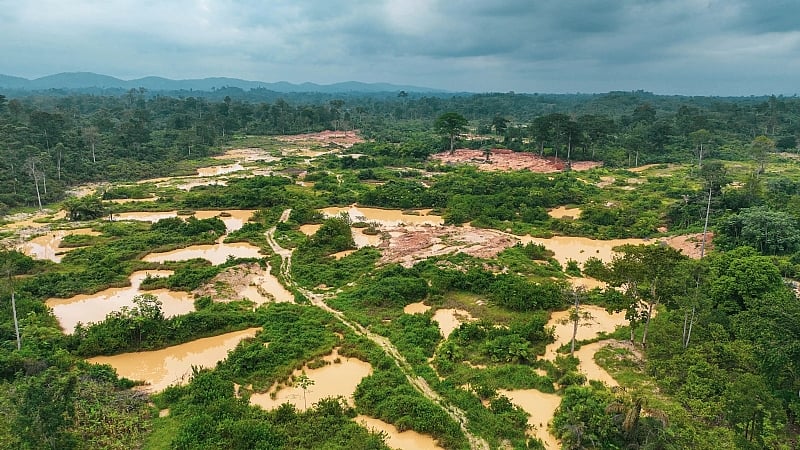The escalating destruction of Ghana’s forest reserves due to illegal mining, commonly known as “galamsey,” has ignited a fervent call for the complete revocation of the Environmental Protection (Mining in Forest Reserves) Regulations, 2023 (L.I. 2462). Environmental advocacy groups, spearheaded by the Ghana Coalition Against Galamsey, are mobilizing public support and demanding decisive government action to protect these vital natural resources. Their petition, accumulating hundreds of signatures, urges President John Mahama to scrap the legislation entirely, arguing that mere amendments are insufficient to address the gravity of the environmental threat. They believe the law, in its current form, facilitates rather than hinders the exploitation of protected areas, essentially prioritizing mining interests over environmental preservation.
At the heart of the controversy lies Regulation 3(2) of L.I. 2462, which grants the President discretionary power to override existing protections for forest reserves in cases deemed to be in the “national interest.” Critics argue that this provision creates a dangerous loophole, susceptible to exploitation for political and economic gain, and undermines the very purpose of the legislation, which is ostensibly to regulate and control mining activities within these sensitive ecological zones. The coalition points to the Atewa Forest Reserve as a prime example of this potential for abuse, alleging that the legislation was specifically designed to pave the way for bauxite mining in this globally significant biodiversity hotspot. They contend that the “national interest” clause provides a convenient pretext for sacrificing irreplaceable natural heritage for short-term economic gains.
Beyond the contentious presidential override, the structural flaws of L.I. 2462 are also under intense scrutiny. Dr. Kenneth Ashigbey, convener of the coalition, argues that the law’s foundation within the Environmental Protection Agency (EPA) Act is inadequate, lacking the robust legal framework necessary to effectively regulate mining operations. He emphasizes the need for mining legislation to be anchored in a more specific and comprehensive legal foundation to ensure adequate oversight and enforcement. The current system, he asserts, is riddled with inadequacies in the permit acquisition process, creating vulnerabilities that are easily exploited by illegal miners, ultimately contributing to the ongoing degradation of Ghana’s forest reserves.
The coalition’s concerns are echoed by other environmental organizations, including A Rocha Ghana. Daryl Bosu, Deputy Director of A Rocha Ghana, contends that even with the proposed amendments to remove the presidential override powers, the legislation remains fundamentally flawed. He points out that hundreds of forest reserves, crucial for biodiversity conservation and water resource protection, remain vulnerable under the existing framework. Mr. Bosu criticizes L.I. 2462 for prioritizing mining interests over other essential ecological functions of forests, highlighting the potential for conflict with national land and forest policies.
Mr. Bosu further argues that the legislation is “retrogressive,” failing to adequately address the complexities of sustainable forest management and potentially jeopardizing the long-term ecological health of the nation. He advocates for a more comprehensive and forward-thinking approach, urging the government to replace L.I. 2462 with a new law that aligns with Ghana’s Forest Development Masterplan. This masterplan, he suggests, provides a more holistic framework for balancing economic development with environmental protection, ensuring the sustainable management of forest resources for present and future generations.
The call for the repeal of L.I. 2462 reflects a growing awareness of the urgent need for stronger environmental protections in Ghana. The ongoing destruction of forest reserves through illegal mining poses a significant threat to biodiversity, water security, and the overall ecological integrity of the country. The coalition’s campaign emphasizes the importance of holding the government accountable for enacting and enforcing effective environmental regulations, ensuring that short-term economic gains do not come at the expense of long-term environmental sustainability. The debate over L.I. 2462 underscores the complex interplay between economic development, environmental protection, and the need for robust legal frameworks to safeguard natural resources for future generations. The outcome of this advocacy effort will have profound implications for the future of Ghana’s forests and the well-being of its people.


